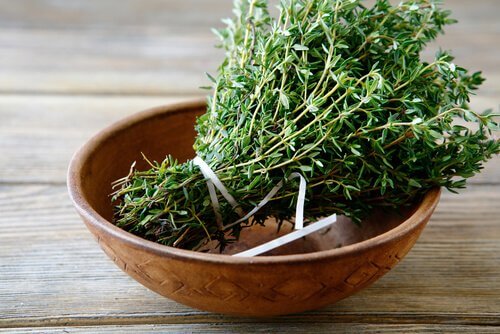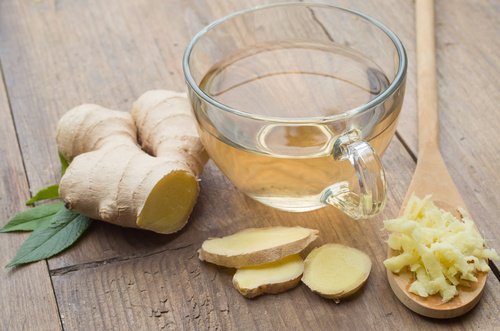10 Natural Ingredients to Reduce the Effects of Smoking


Reviewed and approved by the doctor Nelton Abdon Ramos Rojas
Your lungs play a vital role in your life, providing the oxygen you need to live and removing carbon dioxide through exhalation. They also filter out aggressive environmental agents and prevent certain diseases.
But because they’re so complex and delicate, your lung health can fail and stop being able to perform its many functions properly.
That’s most common with people addicted to tobacco products, because they’re exposing their lungs to toxins and other hazardous substances.
Tobacco users have the highest rate of respiratory illnesses and chronic diseases, like cancer. That’s why it’s absolutely vital for smokers to kick the habit: improving their lifestyle and purifying their lungs.
Along these lines, there are all kinds of natural ingredients to reduce the effects of smoking and help get rid of toxins. Find out what they are below!
Natural ingredients to reduce the effects of smoking
1. Grapefruit

This delicious citrus fruit has a high antioxidant content, which means it can significantly improve the function of your lung cells.
The active compounds in grapefruit prevent cellular dysfunction, a key factor when it comes to stopping tumors from forming.
Smokers who eat grapefruit on a regular basis can reduce their risk of developing cancer and other lung disorders.
Read more:
5 of the Rare Cancers You Should Know About
2. Garlic
Garlic is a food that you just can’t leave out of your diet. Its high content of sulfur-like substances has anti-inflammatory and antioxidant effects that protect your lung health.
Eating garlic raw decreases the risk of chronic diseases in both frequent and occasional smokers.
3. Thyme

This wonderful plant has active substances that make it one of the best natural ingredients to reduce the effects of smoking.
You can use thyme leaves or essential oil as a natural remedy to relieve chest congestion.
It also has antibiotic properties to reduce the presence of bacteria and viruses that cause lung problems.
4. Oregano
Both the plant and its essential oil have a high concentration of carvacrol and rosmarinic acid. They both have very positive effects on the respiratory tract.
Eating oregano and using it in aromatherapy are two great ways to deal with respiratory problems and get rid of excess toxins.
5. Ginger

Ginger root has antibiotic, anti-inflammatory, and aromatic properties that effectively treat bronchial and respiratory problems.
This is thanks to the fact that it dilates blood vessels and also stimulates the removal of excess mucus. What this does is help your lung passageways regenerate properly.
6. Carrot
Considered an indispensable vegetable in any diet, carrots have vitamins A, C, E, and K, which are necessary for the body’s tissues and epithelial cells.
It’s also best to eat them raw to counteract the negative effects of nicotine and other aggressive substances,
7. Eucalyptus

Eucalyptus is one of the most popular natural ingredients to reduce the effects of smoking, and for general lung and respiratory health.
Originally from Australia, it’s also one of the oldest remedies for soothing the irritation and inflammation caused by lung problems.
It’s good for getting excess mucus out of the nostrils and controlling other common symptoms related to colds and the flu.
8. Mint
Mint is an aromatic plant used for a variety of culinary and medicinal purposes. It contains active substances that decrease inflammation and other symptoms that come along with lung problems.
Mint candies, mint vapors, and mint baths are some of the ways you can use it to reduce the effects of smoking.
You might like:
9. Aloe vera juice

The natural juice from an aloe plant has powerful purifying properties and active substances that help cleanse the lungs and reduce the effects of smoking.
It’s even more beneficial when you combine it with a couple of tablespoons of honey and a few drops of lemon juice.
10. Licorice root
Licorice root is very popular around the world and it’s also easy to identify thanks to its unique aroma.
It has anti-inflammatory, soothing, and decongestant properties that help purify and soothe blocked airways.
These remedies won’t work on their own, though. You also need to take all the necessary steps to stop smoking.
It’s not always easy in the beginning, but with willpower and a desire to improve your health, you’ll get there.
All cited sources were thoroughly reviewed by our team to ensure their quality, reliability, currency, and validity. The bibliography of this article was considered reliable and of academic or scientific accuracy.
- Alonso, J. R. (2004). Tratado de Fitofármacos y nutracéuticos. Buenos Aires: Corpus.
- Lawless, J. (2003). Aceites esenciales para aromaterapia. Madrid: Susaeta.
- Shealy, N. C. (1999). Enciclopedia Ilustrada de Remedios Naturales. Madrid: Könemann.
This text is provided for informational purposes only and does not replace consultation with a professional. If in doubt, consult your specialist.








